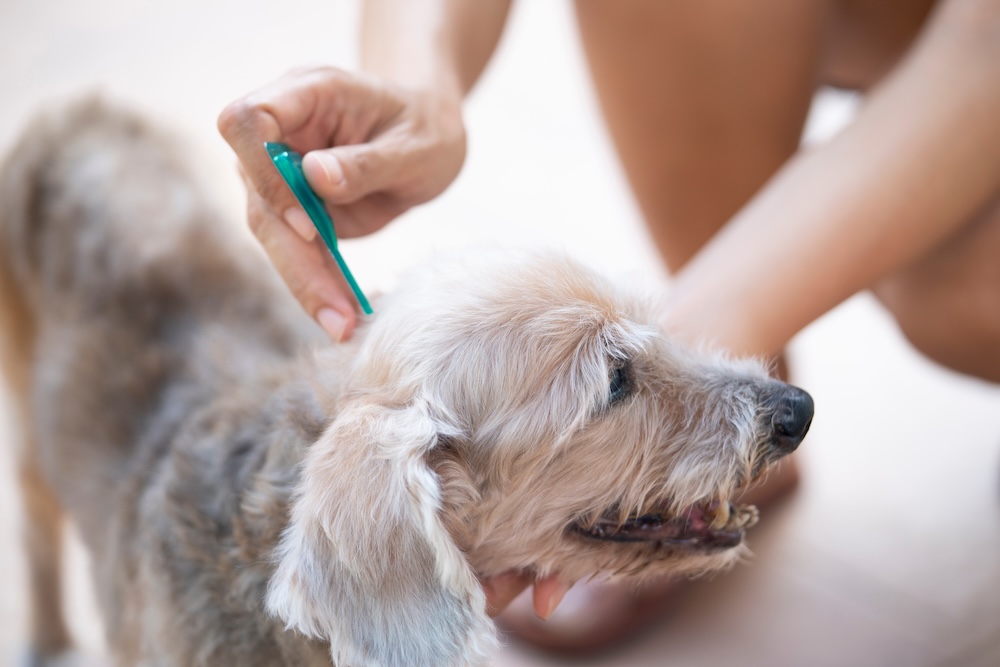Fleas are more than just a nuisance for dogs—they can cause severe itching, allergic reactions, and transmit diseases. As a responsible pet owner, finding the best flea treatment for dogs is crucial to keep your furry friend healthy and comfortable. At Faithful Friends Veterinary Clinic, we aim to provide you with valuable information to help you choose the most effective flea treatments available. In this guide, we’ll explore various flea treatments, their benefits, and how to use them to protect your dog from these pesky parasites.
Fleas and Their Impact
Fleas are small, wingless insects that nest in pet fur and can cause significant discomfort and health issues for your dog. These resilient parasites thrive by feeding on the blood of animals, often leading to a range of problems that can affect your dog’s overall health and well-being.
Intense Itching and Scratching
One of the most immediate and noticeable effects of a flea infestation is intense itching and scratching. Flea bites can irritate your dog’s skin, leading to persistent scratching that can cause skin irritations, sores, and secondary infections. Left untreated, this can result in hair loss and hot spots, further complicating your dog’s health.
Flea Allergy Dermatitis
Some dogs develop flea allergy dermatitis, an allergic reaction to flea saliva. This condition causes severe itching, redness, and inflammation, often leading to open sores and secondary skin infections. Dogs with flea allergy dermatitis require prompt and effective flea control to prevent ongoing discomfort and skin damage.
Anemia
In severe infestations, especially in puppies or small dogs, the blood loss caused by flea bites can lead to anemia. Symptoms of anemia include lethargy, pale gums, and a decrease in appetite. Anemia can be life-threatening if not addressed promptly, making it crucial to manage flea infestations effectively.
Transmission of Diseases
Fleas are vectors for several diseases and parasites that can be transmitted to your dog. One common example is the transmission of tapeworms, which dogs can ingest by grooming and swallowing infected fleas. Fleas can also spread bacterial infections, such as Bartonella (the cause of cat scratch fever), which can affect both animals and humans.
Given these risks, it’s essential to implement an effective flea control strategy to protect your dog. Regular use of preventive treatments, along with maintaining a clean environment, can help keep fleas at bay and ensure your dog remains healthy and comfortable. By understanding the dangers posed by fleas and taking proactive steps, you can safeguard your dog against these pesky parasites and the health issues they cause.
Types of Flea Treatments for Dogs
There are several types of flea treatments available, each with its own advantages and application methods. Understanding the options can help you choose the best flea treatment for your dog.
The following brand name treatments are listed as examples and not necessarily endorsed by Faithful Friends Vet Clinic.
Topical Treatments
Topical treatments, also known as spot-on treatments, are applied directly to your dog’s skin, usually between the shoulder blades. They are easy to apply and provide long-lasting protection.
- Advantage II: Kills fleas at all life stages and provides protection for up to one month.
- Frontline Plus: Combines flea and tick protection, effective for up to 30 days.
- Revolution: Protects against fleas, heartworms, ear mites, and some ticks, with monthly application.
Oral Medications
Oral flea medications are given to your dog in the form of a chewable tablet or pill. They work from the inside out, providing systemic protection against fleas.
- NexGard: A monthly chewable that kills fleas and ticks.
- Bravecto: Provides up to 12 weeks of flea and tick protection with a single dose.
- Capstar: A fast-acting tablet that starts killing fleas within 30 minutes, but requires more frequent dosing.
Flea Collars
Flea collars are worn around your dog’s neck and release active ingredients that repel and kill fleas. They offer extended protection, often lasting several months.
- Seresto Collar: Provides up to 8 months of continuous flea and tick protection.
- Adams Plus Flea and Tick Collar: Effective for up to 7 months and also repels mosquitoes.
Flea Shampoos
Flea shampoos are used to bathe your dog and kill fleas on contact. They are useful for immediate relief but may need to be combined with other treatments for long-term protection.
- Adams Plus Flea and Tick Shampoo: Contains ingredients that kill fleas, ticks, and lice, and includes soothing aloe and oatmeal.
- Vet’s Best Flea and Tick Shampoo: Made with natural ingredients like peppermint oil and clove extract, effective for immediate flea control.
Flea Sprays
Flea sprays can be applied directly to your dog’s coat and living environment to kill and repel fleas.
- Vet’s Best Flea and Tick Home Spray: Uses natural ingredients and is safe for use on dogs and around the home.
- Adams Plus Flea and Tick Spray: Effective for killing fleas, ticks, and mosquitoes on contact.
Choosing the Best Flea Treatment for Dogs
Selecting the best flea treatment for dogs involves considering a variety of factors, including your dog’s age, health, lifestyle, and any existing medical conditions. Here’s a detailed guide to help you make an informed decision on the most suitable flea treatment for your canine companion.
Consult Your Veterinarian
Before starting any flea treatment regimen, it’s essential to consult your veterinarian. They can provide personalized recommendations based on your dog’s specific needs and health status. Your vet can also identify any potential allergies or sensitivities to certain products and help you choose the safest and most effective option.
Consider Your Dog’s Lifestyle
Your dog’s lifestyle plays a significant role in determining the best flea treatment. For instance, dogs that spend a lot of time outdoors, in parks, or around other animals are at higher risk of encountering fleas. In such cases, you might need a more robust, broad-spectrum treatment that not only kills fleas but also protects against ticks and other parasites. On the other hand, indoor dogs may benefit from a milder treatment regimen.
Evaluate the Treatment Types
There are various types of flea treatments available, each with its advantages and considerations:
Topical Treatments
Topical treatments (also known as spot-on treatments) are applied directly to your dog’s skin, typically between the shoulder blades. They are easy to apply and provide long-lasting protection, usually for a month.
- Pros: Easy to apply, effective against fleas and other parasites, water-resistant formulas available.
- Cons: Some dogs may experience skin irritation, and care must be taken to prevent children or other pets from coming into contact with the application site.
Oral Medications
Oral medications are chewable tablets or pills that provide systemic protection against fleas. These treatments work from the inside out, killing fleas quickly after they bite your dog.
- Pros: Convenient, no risk of residue transferring to humans or other pets, often effective against multiple parasites.
- Cons: Requires your dog to swallow a pill, may cause gastrointestinal upset in some dogs.
Flea Collars
Flea collars are worn around your dog’s neck and release active ingredients that repel and kill fleas. They offer extended protection, often lasting several months.
- Pros: Long-lasting, cost-effective, minimal application effort.
- Cons: Some dogs may find collars uncomfortable, and they may not be effective for dogs with thick fur around the neck.
Flea Shampoos
Flea shampoos are used to bathe your dog and kill fleas on contact. They are useful for immediate relief but may need to be combined with other treatments for long-term protection.
- Pros: Immediate flea removal, can soothe irritated skin, cost-effective.
- Cons: Requires frequent application, not a standalone long-term solution.
Flea Sprays
Flea sprays can be applied directly to your dog’s coat and living environment to kill and repel fleas.
- Pros: Versatile use on dogs and household items, effective for spot treatments.
- Cons: Requires frequent application, potential for skin irritation.
Check for Allergies and Sensitivities
Some dogs may be sensitive or allergic to certain ingredients in flea treatments. Monitor your dog for any adverse reactions, such as excessive scratching, redness, swelling, or changes in behavior. If you notice any of these signs, discontinue the treatment and consult your veterinarian for alternative options.
Ease of Use
Choose a treatment method that you can easily administer and that fits into your routine. For example, if your dog resists taking pills, a topical treatment or flea collar might be more suitable. Similarly, if your dog has a thick coat, a flea shampoo or spray might be more effective in reaching the skin.
Cost and Budget
Consider the cost of the flea treatment and how it fits into your budget. While some treatments may have a higher upfront cost, they may provide longer-lasting protection and potentially reduce the need for additional products or treatments.
Preventive Measures
In addition to selecting the best flea treatment for your dog, implementing preventive measures can help keep fleas at bay. Regularly clean your dog’s bedding, vacuum your home, and maintain your yard to reduce the flea population. Combining these measures with an effective flea treatment will provide comprehensive protection for your dog.
Putting it All Together
Choosing the best flea treatment for dogs requires careful consideration of various factors, including your dog’s lifestyle, health, and specific needs. At Faithful Friends Veterinary Clinic, we are here to guide you through this process and help you find the most effective solution for your furry friend. By consulting with your veterinarian and understanding the different treatment options available, you can ensure your dog remains flea-free and enjoys a healthy, comfortable life.
If you have any questions or need personalized recommendations, don’t hesitate to contact us.
Your pet’s health and well-being are our top priorities! ?
Preventing Flea Infestations
In addition to using flea treatments, taking preventive measures can help keep fleas at bay:
- Regular Grooming: Brush and bathe your dog regularly to check for fleas and maintain a healthy coat.
- Clean Living Areas: Wash your dog’s bedding, vacuum carpets, and clean furniture to remove flea eggs and larvae.
- Outdoor Maintenance: Keep your yard clean and free of debris where fleas might thrive.
Finding the best flea treatment for dogs is essential for keeping your pet healthy and comfortable. By understanding the different types of treatments and considering your dog’s specific needs, you can choose the most effective solution. At Faithful Friends Veterinary Clinic, we are here to help you with all your pet care needs. If you have any questions about flea treatments or need personalized recommendations, don’t hesitate to contact us. Together, we can ensure your dog enjoys a flea-free life.




